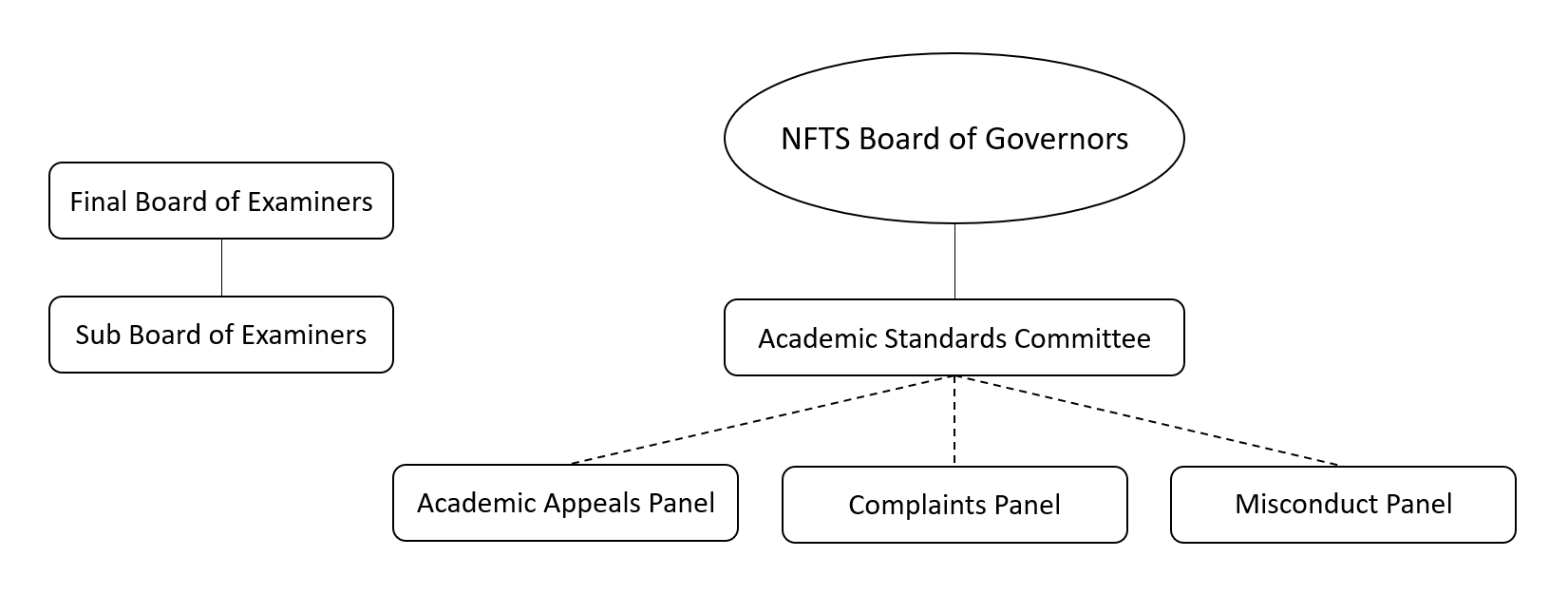Quality Assurance
Quality Assurance Handbook
Introduction
Please note all files published are in pdf format. Please contact kthomson@nfts.co.uk if you would like the files in an alternative format.
The National Film and Television School (‘the School’) is committed to the continuous enhancement of the quality of student learning opportunities, and a rigorous and robust approach to the academic standards of its awards.
This handbook has been compiled to provide a clear and comprehensive description of the School’s Quality Assurance systems and should be read in association with:
- the School's Academic Regulations from Jan 2023 | from Sept 2023 | from Sept 2025
- the School’s policies and procedures published on the website in relation to:
- Admissions
- Equality, Diversity and Inclusion Strategy
- Health and Safety
- Bullying, Harassment and Sexual Misconduct
- Intellectual property rights
- Data Protection
- Freedom of Speech
- Complaints Procedure - Students
- Academic Appeals
- Attendance
- Student Misconduct
- Extenuating Circumstances
- Academic Misconduct
- Coursework Submission
- Fitness to Study
- Social Media
- Course handbooks (published to students on Workplace)
- Academic Governance

The School’s Academic Standards Committee is the body responsible for academic standards within the School and it carries out detailed consideration of matters relating to quality assurance and enhancement. The Committee reports regularly to the School’s Board of Governors, and members of the Board attend an Extraordinary meeting of the Academic Standards Committee each year.
Terms of Reference for the committee (pdf)The standards of NFTS awards, that is the level of achievement that a student has to demonstrate to be eligible for an award of the School, and the quality of student learning opportunities are assured by the Academic Standards Committee through:
- Approval of new courses
- Modifications to courses
- Annual Course Evaluation
- External Examining
- Periodic Course Review
- Arrangements for Collaborative Provision
- Learning, Teaching and Enhancement Strategy
The School’s Learning, Teaching and Enhancement Strategy supports the School’s Corporate Plan.
- Research, Innovation and Knowledge Exchange Strategy
The School’s Research, Innovation and Knowledge Exchange Strategy supports the School’s Corporate Plan
- OFS Conditions of Registration
The Office for Students requires UK higher education providers to comply with general ongoing Conditions of Registration relating to quality and standards.
The School’s regulations, policies and procedures have all been designed to take full account of these conditions of registration.
- The UK Quality Code
The Quality Assurance Agency’s Quality Code for Higher Education is a reference point for UK higher education, articulating principles for securing academic standards and assuring and enhancing quality. Engaging with the Quality Code is voluntary for most higher education providers in England, including the School, on the basis that those providers are required instead to comply with the Office for Students’ Regulatory Framework and Conditions of Registration.
The School’s regulations, policies and procedures have all been designed to take full account of the Quality Code.
- Student Engagement in Quality Assurance and Enhancement
Formal and informal student participation and engagement is crucial to the quality of the School's teaching and learning. By taking opportunities to be involved with quality processes and providing feedback on their experience, students are not only influencing their own period of study but that of future students.
There are various ways in which students are involved in quality assurance and enhancement. These include providing informal and formal feedback, and student representation on the Academic Standards Committee (ASC) and the Board of Governors. This enables the School to gain an insight into the student perspective.
The School, in line with the industry it serves, has a philosophy of welcoming feedback. Experience suggests that students are enthusiastic about expressing any concerns about their academic experience to individual tutors, Heads of Department and staff, as well as the School Director, the Director of Curriculum and the Registrar. Tutors are encouraged to invite and carefully consider feedback.
The formal student feedback mechanisms include representations from the Students’ Union, module evaluation questionnaires and the annual student survey.
The School has a formally constituted independent Student Union led by a sabbatical Student Union President, and who is supported by elected student representatives. The Student Union President meets with the Registrar regularly to raise issues on behalf of the student body.
Module evaluation is undertaken by departments, and student feedback can be gathered either in writing or orally. Feedback from module evaluations are considered by course teams during the year and issues and actions are reported as part of the Annual Course Evaluation (ACE) process.
All students are asked to participate in the School’s internal annual student survey which includes both qualitative and quantitative elements. The survey takes places in August/September for those diploma courses that finish at the end of the summer and in December at the end of the academic year for all other diplomas and all MAs. The results of the survey are discussed by the management team, ASC, the Board of Governors and are shared with the Students’ Union. Course specific survey results are considered as part of the Annual Course Evaluation process.
- Recognition of Prior Experiential Learning
NFTS recognises that some potential students will not have formal academic qualifications. Accordingly, it has a rigorous system for assessing non-traditional applicants.
In each case, the relevant Head of Department must provide a written recommendation from the selection panel justifying the rationale for accepting the student that is then considered by the School’s Director and by the Registrar.
- Approval of New Courses
All NFTS courses must meet appropriate academic standards, provide current and coherent curricula and offer a high quality student learning experience. In order to achieve this all new Master's and postgraduate diploma courses are subject to the School's course approval policy and procedure.
The course approval process encompasses strategic and quality approval of courses, and major modifications to existing courses.
- Modifications to Courses
The minor modifications process allows changes to be made to courses and modules, with appropriate consultation, and ensures that a record is made of the changes made. The procedure has been designed to ensure that the academic quality and standards of the School’s awards are maintained, whilst supporting the continuous enhancement of the student learning experience.
Modifications to Courses- Annual Course Evaluation
Annual Course Evaluation is an essential element of the School’s Quality Assurance and Enhancement processes. It allows the NFTS to ensure that the courses it delivers meet the expectations of staff and students, and provides opportunities to develop and enhance our provision.
Annual Course Evaluation- External Examining
External Examiners are an important part of the School’s quality assurance and enhancement procedures. At the end of each final assessment cycle, the External Examiners provide an annual written report on their observations regarding the School’s assessment processes and student assessed work. They provide comments and recommendations upon whether:
- the standard set for the award is consistent with that of the national university system and related subject areas
- the academic standards and student achievements are comparable with similar programmes in other UK higher education institutions
- the processes to assess student work are sound and have been fairly conducted
In addition, they:
- are involved and influential in the overall decision making process of the Final Exam Board and endorse the decisions made by the Board
- identify examples of good practice and innovation
- provide recommendation on opportunities to enhance the quality of learning opportunities provided.
- Periodic Course Review
The NFTS conducts a rolling 6 year programme of Periodic Reviews to monitor the quality of teaching and learning within its academic departments. Periodic course reviews allow the School to make sure that its departments are fulfilling their requirements in maintaining academic standards and teaching quality. The review process is intended to be a developmental activity; highlighting areas of good practice and identifying any aspects of provision that may benefit from greater cohesion.
Periodic Course Review- Course Closure or Suspension
The School regularly reviews and updates its course portfolio to ensure currency and to reflect best practice, taking account of student and external views. In exceptional circumstances, a course may cease to exist or the School may no longer be able to teach a course or an aspect of a course to a specific group of students, or the School may introduce a substantial change which will impact on applicants and/or current students.
There are a number of reasons why the School might close or suspend recruitment to a course, or make substantial changes. These may include but are not limited to the following:
- demand for the course is too small to cover the cost of delivery (i.e. insufficient applicants)
- outcome from the periodic review or course (re)-approval process
- staff involved in the delivery of the course are temporarily/permanently unavailable and it is impossible to substitute them
- replacing an existing course with a new one
- changing strategic priorities at subject, or School level
- closure/termination of collaborative partnership which results in the withdrawal of a course
Course closure, suspension or substantial change would normally be initiated for the following academic year unless there are circumstances beyond the School’s control. In the event of closure or suspension, no new applicants would be recruited. Students already on the course would be supported to complete their course successfully or if this was not possible due to circumstances beyond the control of the School, transitional arrangements would be made in consultation with the student(s) affected.
The School will endeavour to mitigate the impact that course closure, suspension or substantial change will have on current and prospective students. In the event of course closure, a planned timeline and action plan for managing the closure and for communicating with applicants and current students must be drawn up by the department in liaison with the Quality Assurance Manager. The action plan must explicitly consider the experience of current and prospective students to protect against any adverse impact a course closure may have.
At all times the School will be mindful of its consumer law obligations to students and applicants, and of the School’s Terms and Conditions.
- Arrangements for Collaborative Provision
Some NFTS courses offer students the opportunity to undertake work placements or work experience with external companies and organisations. The Placement and Work Experience Policy aims to promote good practice and ensure that the School meets its responsibilities with regard to managing the quality of the student learning experience as well as their safety and wellbeing in the context of placement or work-based learning as part of a course of study.
Placement and Work Experience Learning Policy
Any queries about the contents of this Handbook, or about any of the quality assurance processes, should be addressed to the Quality Assurance Manager kthomson@nfts.co.uk

